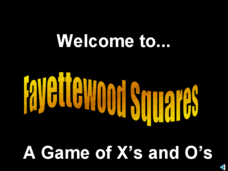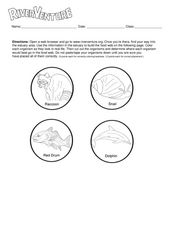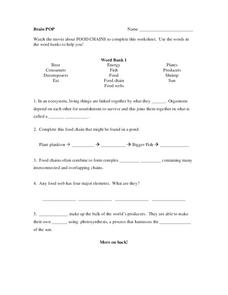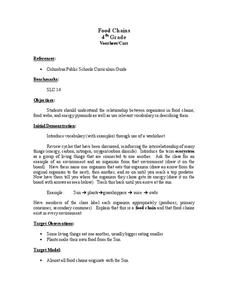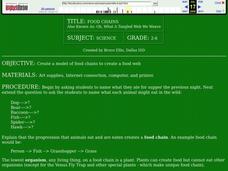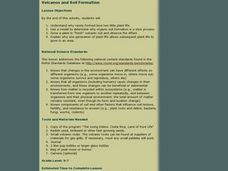Curated OER
What is Coral?
Students discuss what they know about coral reefs and are introduced to the importance of preserving coral reefs. In this coral reef lesson, students make connections between coral ecology in the classroom and in the real environment...
Curated OER
Using Technology in Science
You can spice up your science content by incorporating technology into your lesson plans.
Curated OER
Talkin' Trash
Use these lesson plans to illustrate the effects of trash on our environment and the ways in which we dispose of it.
Curated OER
Amphipod Ecology
Students count amphipods under kelp wracks of varying ages to explain how long it takes for them to find their food source. They collect and represent the data.
Curated OER
Worm Watching
Students examine the role earthworms play in building soils. They discuss worms and what they do with soil, make predictions and draw pictures, and observe their worms in soil over a two week period.
Curated OER
Build Your Own Sea Turtle
Students design and create their own sea turtles. They investigate the marine turtle anatomy by constructing a model of a sea turtle. They incorporate the vocabulary that identifies each part of the sea turtle's anatomy.
Curated OER
The Present Simple-Daily Routines and Likes and Dislikes
In this daily routines worksheet, learners read paragraphs telling about two peoples days, likes, and dislikes. They work in partners to ask and answer twenty-four comprehension questions about each section.
Curated OER
Fayettewood Squares
If used as a center activity, this short presentation could be a motivating way for learners to review material relating to plants, the circulatory system, and more. However, there are only nine questions. It would be more useful if...
Curated OER
Vocabulary: Kansas Prairies
Students explore the ecosystem by reviewing scientific vocabulary terms. In this environmental awareness lesson, students identify the differences between abiotic and biotic factors and their relationship to the Earth. Students define...
Curated OER
Pond Ecosystem Field Trip
Students investigate the environment by participating in a class trip. In this pond ecosystem lesson, students define a list of vocabulary terms associated with ponds such as invertebrate and metamorphosis. Students attend a field trip...
Curated OER
River Venture
For this food web worksheet, students color 4 animals and put them in the correct spot on a food web. They answer 3 related short answer questions.
Curated OER
Clay Hill Animal Sampling
Students create animal print casts from molds in the classroom. They use the cast patterns to identify animal prints on a field trip in which they locate animal tracks, identify the location with GPS and create field casts of the...
Curated OER
Food Chains
For this chemistry worksheet, students watch a movie about food chains and use it to respond to each of the questions stated. They use the list of works in the word banks to assist them in matching the correct term to its description.
Curated OER
Ecosystem Worksheet
In this environment worksheet, students find the words that are related to the ecosystem. The vocabulary is used to help develop environmental awareness.
Curated OER
Food Chains
Fourth graders investigate food chains. They review cycles and discuss ecosystems. They select an environment and create a food chain in small groups. They write their food chain and label it for the class to evaluate. They create...
Curated OER
Creature Features
Students examine why certain animals live in only specific places throughout the world. Using animals, they classify them based on their characteristics and identify their basic needs. They also observe and compare the life cycles of...
Curated OER
Exploring Ecosystems
Fourth graders create an ecosystem as a class. They have already produced smaller ones. They use a pond or something similar on school grounds to meet the needs of certain plants and animals of their ecosystem. Specifically created will...
Curated OER
Life Cycles
Using computers, Students work in small groups and progress through the roles of Explorer, Researcher, Designer, and Evaluator as they study the life cycle of plants, insects, butterflies and frogs.
Curated OER
Why So Many Frogs?
Students explain the different stages in the growth of a frog, then analyze and collect data to make generalizations about a larger population. They determine the survival rate of a population of tadpoles under controlled conditions.
Curated OER
Food Chains, Food Webs, Biomass Pyramids and Cycle
In this food chains worksheet, students complete a crossword puzzle by placing 16 terms into the puzzle that match the clues given. Students review food webs, biomass pyramids, and the water cycle.
Curated OER
Researching the Nutrient Cycle
In this researching the nutrient cycle instructional activity, students read about the cycle of nutrients, look at the diagram, then answer two questions by doing research on this topic.
Curated OER
Using Children's Literature to Teach Writing: No, David!
Students review beginning, middle, and end of a story and how details add to a story.
Curated OER
Animals Multiple Choice Definitions Worksheet
In this animal vocabulary worksheet, students complete multiple choice questions where they define the animal terms given to them. Students complete 7 questions.







